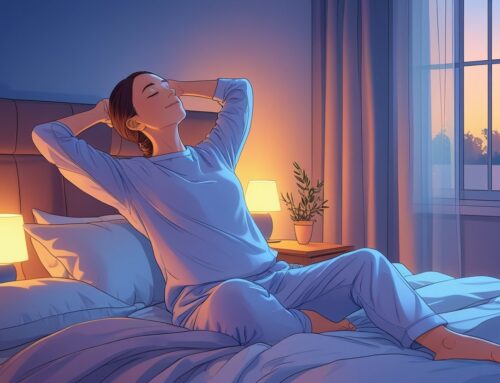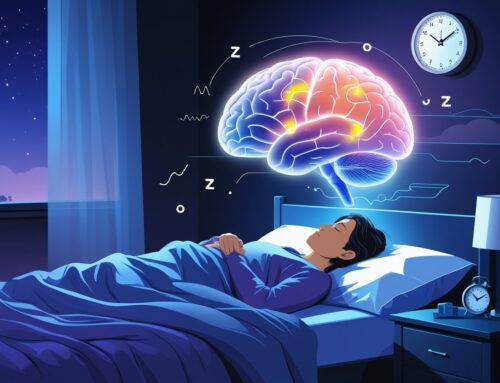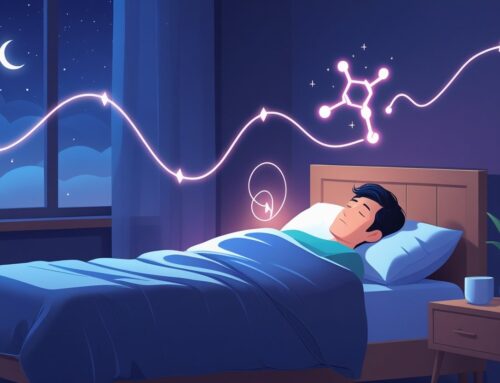Stress directly disrupts sleep by making it difficult to fall asleep and by causing restless nights. High stress levels bring racing thoughts that prevent rest, which reduces the quality and duration of sleep. Recognizing this link helps improve both mental health and sleep habits.
Stress interferes with the body’s ability to relax and reach deep sleep stages, resulting in fragmented rest. Poor sleep then increases stress and creates a loop that is hard to break. Small changes in daily habits and practical stress management can improve sleep quality over time.
People who understand how stress undermines sleep can take action to tackle both issues. Exploring effective stress relief techniques and adjusting routines may lead to deeper, more restorative sleep.
Key Takeaways
- Stress can make it hard to fall asleep and stay asleep.
- Poor sleep and stress often feed into each other.
- Managing stress and building better sleep habits can boost overall well-being.
- A supportive mattress helps break the stress-sleep cycle by easing pressure points, improving alignment, and promoting deeper, more restorative rest.
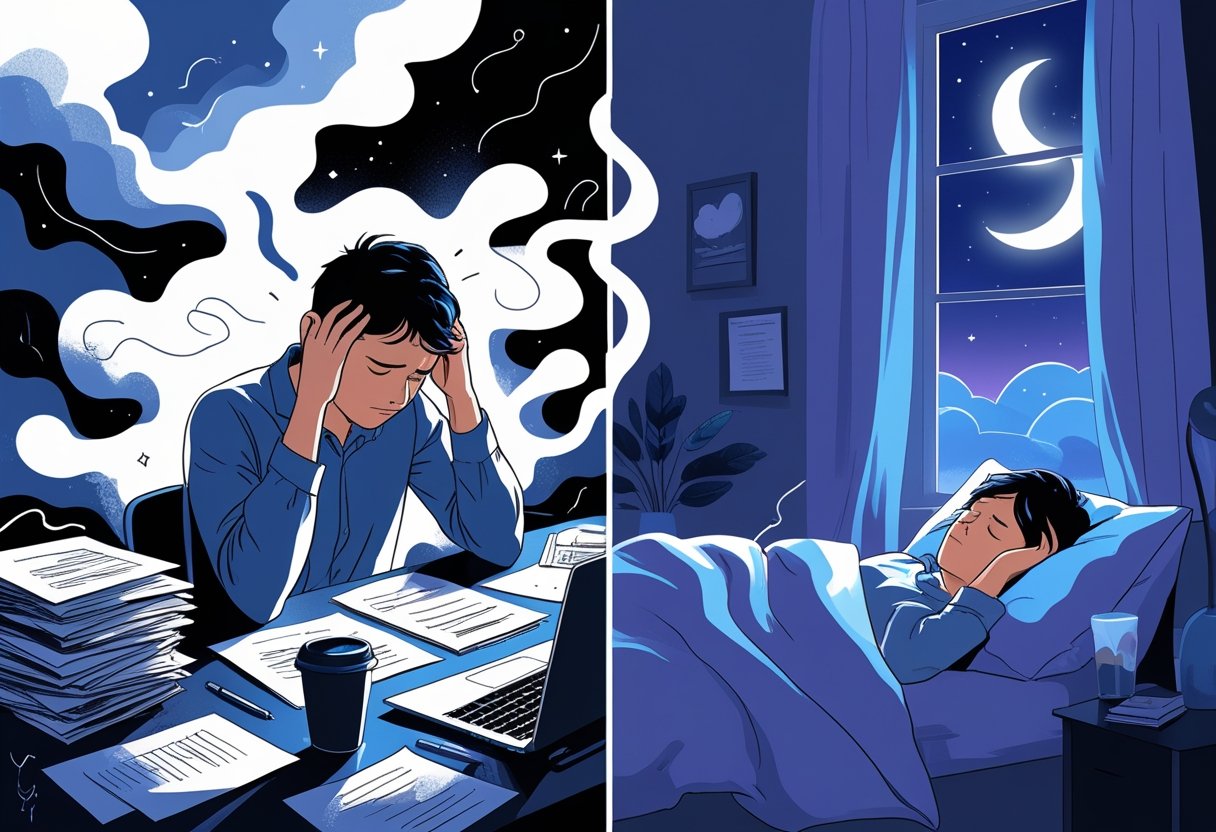
Understanding Stress and Sleep

Stress affects sleep by disrupting the brain’s ability to relax and enter restorative stages. As stress levels rise, it causes trouble falling asleep, frequent waking, and poor sleep quality. These issues tend to worsen when stress persists over time, which creates a cycle that undermines overall health.
The Relationship Between Stress and Sleep
Stress triggers hormones like cortisol that prepare the body for a “fight or flight” response. This reaction keeps the body alert and makes relaxation difficult. As a result, sleep cycles get interrupted and reduce both deep and REM sleep, two stages essential for mental and physical recovery.
The relationship runs both ways. Poor sleep heightens stress levels, which makes it harder to manage daily demands. This sets off a loop of stress and sleep problems that weakens mood, focus, and immune health. People respond differently, and some are more sensitive to stress’s impact on sleep than others.
Overview of Stress-Related Insomnia
Stress-related insomnia refers to difficulty falling or staying asleep due to high stress. It often begins after a triggering event but may turn chronic if the stress continues. Typical signs include lying awake for long periods, waking frequently, or rising too early.
Those with this form of insomnia often feel drained during the day but remain restless at night. Unlike other types, this insomnia ties directly to emotional or psychological strain. Treatment usually involves lowering stress, improving sleep routines, and sometimes adding therapy or medication.
Stress-Induced Sleep Disorders
Stress can contribute to sleep disorders beyond insomnia. One example is sleep reactivity, where even minor stress causes serious sleep disruption. People with this trait face a higher risk of stress-related insomnia.
Paradoxical insomnia is another condition linked to stress, where individuals believe they haven’t slept at all despite normal results on sleep studies. Anxiety and stress amplify this perception, which leads to greater frustration and continued sleep problems.
Techniques like relaxation exercises, regular physical activity, and better sleep hygiene provide relief. Understanding how stress affects sleep, both biologically and mentally, remains crucial in restoring restful sleep and stopping the cycle of stress-driven insomnia.
How Stress Affects Sleep Quality
Stress triggers changes in the body that disrupt normal sleep patterns. It affects how quickly someone falls asleep, the depth of their sleep, and how well the body recovers overnight.
Biological Impact of Stress on Sleep Cycles
When stress hits, the body releases hormones like cortisol and adrenaline. These hormones activate the “fight or flight” response, which raises heart rate and blood pressure. As a result, the body struggles to relax and enter deep sleep stages. Stress also interferes with the brain’s sleep-wake system. Elevated cortisol levels delay the natural drop in body temperature and alertness required for sleep. This interrupts the normal cycling between REM and non-REM sleep, lowering overall sleep quality.
These biological reactions create a fragile sleep system. Repeated stress often worsens this imbalance, making it harder to maintain a consistent sleep cycle. This is especially common in people dealing with insomnia or stress-related sleep disturbances.
Chronic Stress and Sleep Deprivation
Prolonged stress leads to chronic sleep deprivation. If stress keeps someone awake night after night, the body misses out on restorative sleep. This can trigger fatigue, mood swings, and a weakened immune system. Stress and poor sleep often feed into each other. Lack of sleep raises stress levels, and higher stress makes it tougher to sleep well. This loop raises the chances of developing insomnia, where stress consistently disrupts sleep.
Many people mistake tiredness as something they can just push through. However, long-term sleep loss linked to stress comes with serious health consequences. Learning to manage stress is essential for breaking the cycle of stress-induced insomnia and sleep deprivation.
Sleep Latency and Stress
Sleep latency refers to the time between lying down and falling asleep. Stress tends to lengthen this period because the mind stays alert. Worries or racing thoughts can keep someone awake far longer than usual. The body stays on high alert due to stress, even when physical fatigue sets in. As a result, the calming signals required for sleep get delayed.
People often wonder, “Can stress keep you awake?” Yes, it can stretch sleep latency and reduce total sleep time. This issue comes up frequently in conversations about stress-related sleep problems and insomnia.
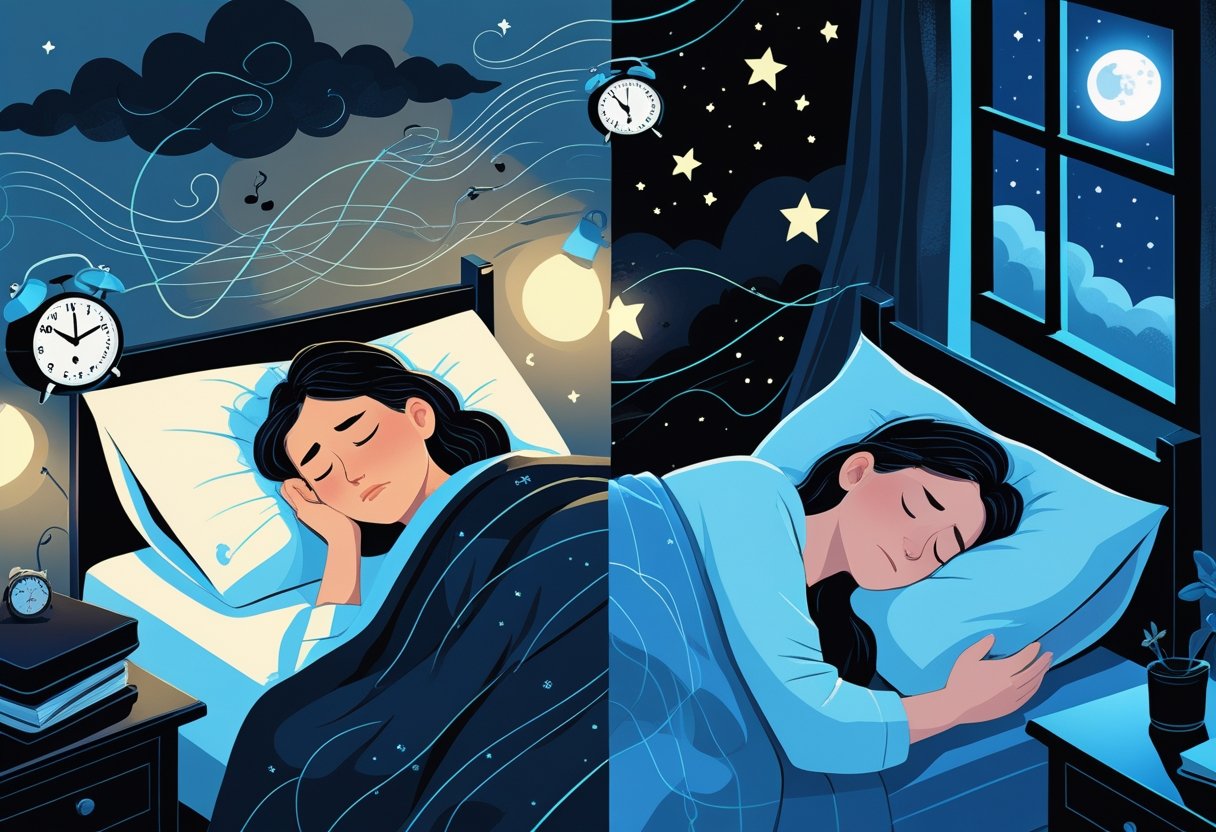
Symptoms of Stress-Related Sleep Problems
Stress affects sleep in specific ways and disrupts both the ability to fall asleep and the quality of rest. These disruptions come with distinct signs that reveal when stress interferes with sleep.
Common Indicators and Warning Signs
People under significant stress often find it hard to fall asleep, wake up frequently, or feel unrested in the morning. Physical symptoms may include a racing heart, muscle tension, and rapid breathing before bedtime.
Signs to watch for include:
- Difficulty falling asleep despite feeling tired
- Frequent waking during the night
- Feeling tired even after a full night’s sleep
- Increased irritability or anxiety during the day
- Changes in appetite or energy levels
These signs usually appear when someone feels overwhelmed, and the body stays in a heightened state of alertness, which makes it difficult to relax enough to sleep.
Recognizing Insomnia Linked to Stress
Insomnia related to stress often starts during or shortly after a period of intense pressure, such as tight work deadlines or personal struggles. Someone unable to sleep due to stress may also worry about not sleeping, which only worsens the issue.
Typical symptoms include:
- Taking more than 30 minutes to fall asleep on a regular basis
- Sleep that feels shallow or disrupted
- An overactive mind that won’t quiet down at night
- Daytime fatigue, trouble focusing, or mood swings
These symptoms may start off as temporary but can turn into chronic issues if stress remains constant. In more severe cases, stress-related insomnia can resemble PTSD symptoms, where sleep problems persist after traumatic experiences.
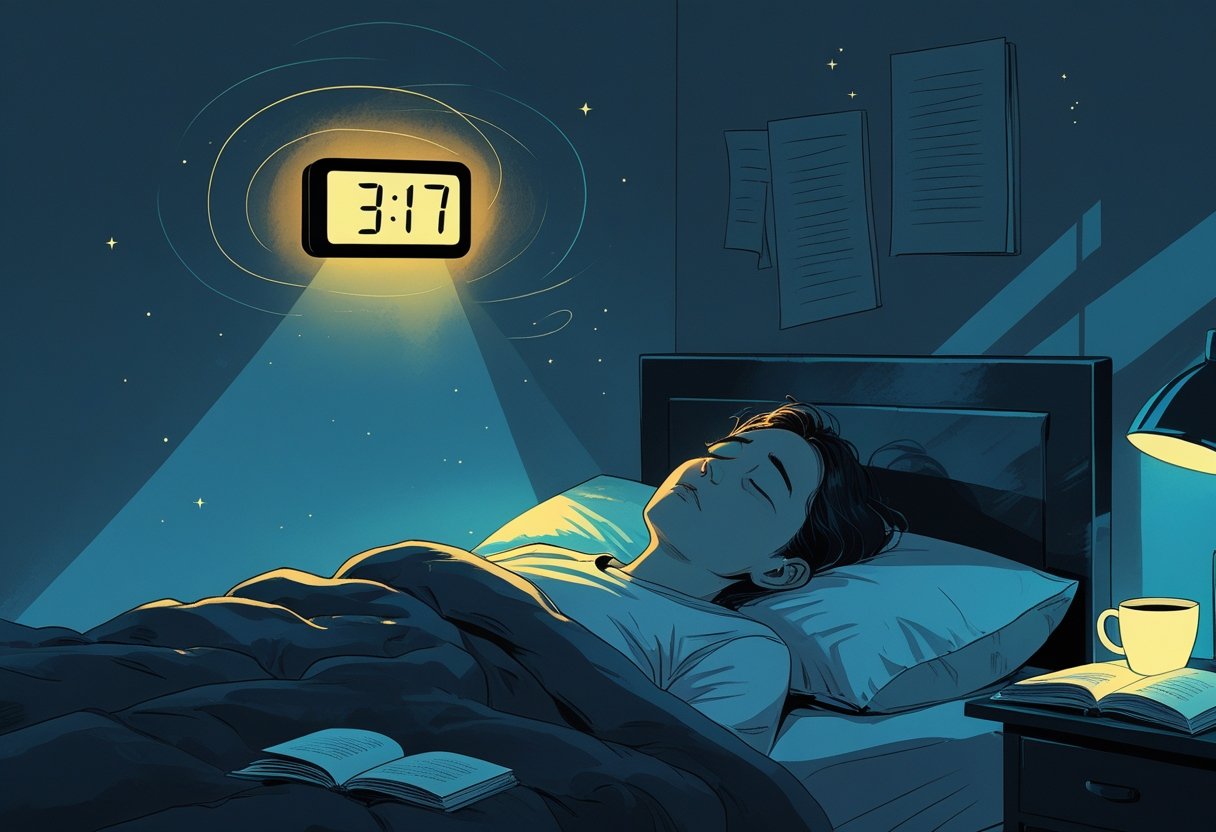
Can Stress Affect Snoring and Other Sleep Behaviors?
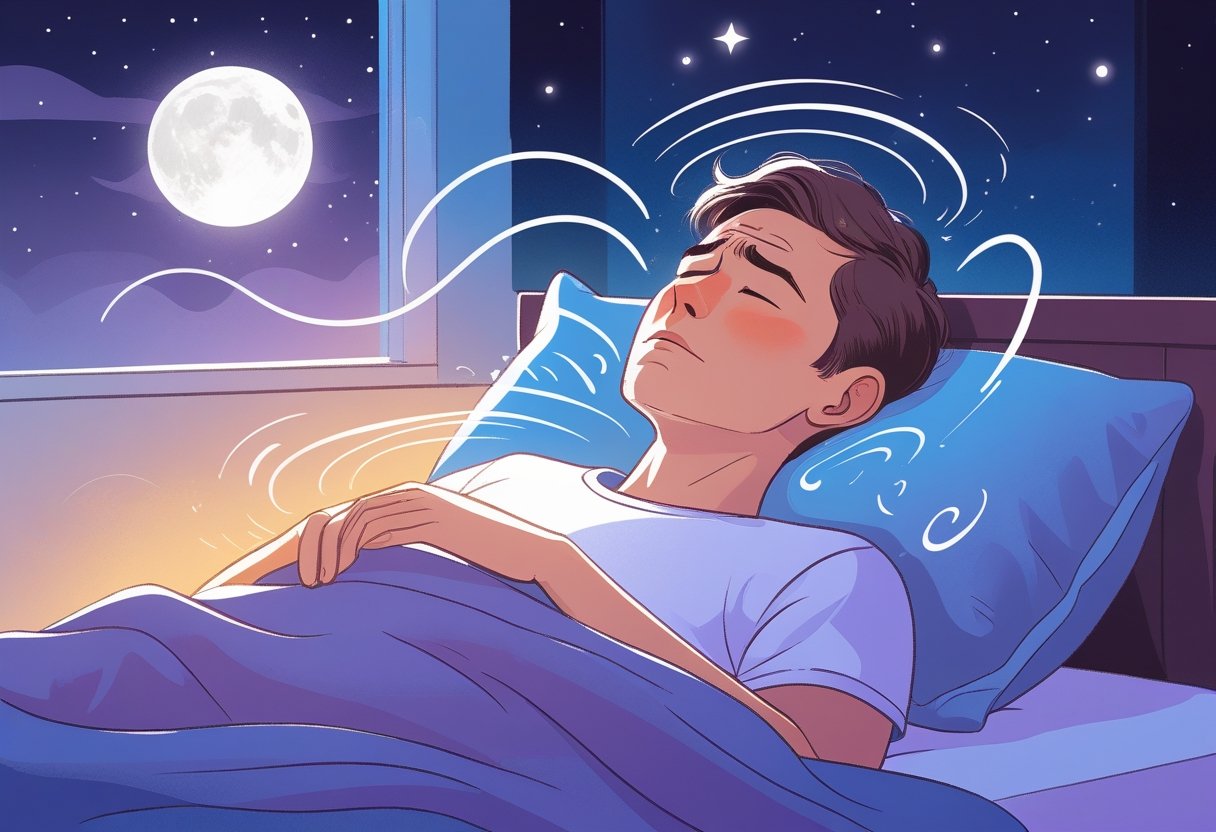
Stress changes how the body functions during sleep. It tightens muscles and disrupts normal sleep patterns. These effects can lead to snoring and other issues that interfere with rest. Understanding these connections sheds light on the many ways stress undermines sleep.
The Connection Between Stress and Snoring
Stress tightens the muscles in the throat, which narrows the airway and makes breathing more difficult. When airflow becomes restricted, vibrations occur and cause snoring. This muscle tension often pairs with poor sleep quality. A stressed person tends to wake more often throughout the night. This fragmented rest increases the chance of snoring because the airway muscles don’t stay fully relaxed.
Stress may also lead to habits that worsen snoring, such as drinking alcohol or sleeping in poor positions. Because stress contributes to these behaviors, managing it may reduce snoring. This relationship is explored further in the article on stress and snoring.
Other Sleep Disturbances Tied to Stress
Stress causes more than just snoring, it often brings on other sleep problems. Many people struggle with insomnia, finding it hard to fall or stay asleep. Stress keeps the brain alert when it should begin to slow down. It also throws off sleep cycles and reduces deep sleep, leaving the body without time to recharge. In some cases, stress triggers unusual sleep behaviors like sleepwalking or frequent tossing and turning.
These disruptions can build on each other, creating a cycle where poor sleep raises stress levels the next day.
How Sleep Affects Stress Levels
Sleep is important in controlling stress. Poor sleep makes it harder for the body and mind to handle emotions, while good sleep improves the ability to manage daily problems.
Sleep Deprivation and Emotional Regulation
A lack of sleep weakens emotional control. Sleep loss raises stress hormone levels such as cortisol, which makes irritability, anxiety, or feeling overwhelmed more likely. It also lowers activity in the brain areas responsible for calming emotions, which leads to stronger reactions to negative events. Over time, this can create a cycle where stress builds and sleep continues to decline.
Better sleep helps the brain process emotions and recover from daily stress. Adequate rest supports stable moods and sharper thinking during tough situations.
Sleep as a Buffer Against Daily Stressors
Quality sleep acts as a buffer against daily stress. After a full night of rest, the body’s stress response becomes less intense, so problems feel more manageable. Sleep sharpens focus and problem-solving, which allows better handling of challenges. It also restores energy and helps the body take on tasks more effectively.
By lowering stress hormones and building resilience, sleep protects the body from the wear and tear caused by constant stress. Consistent and restful sleep strengthens the ability to cope without harming long-term health.
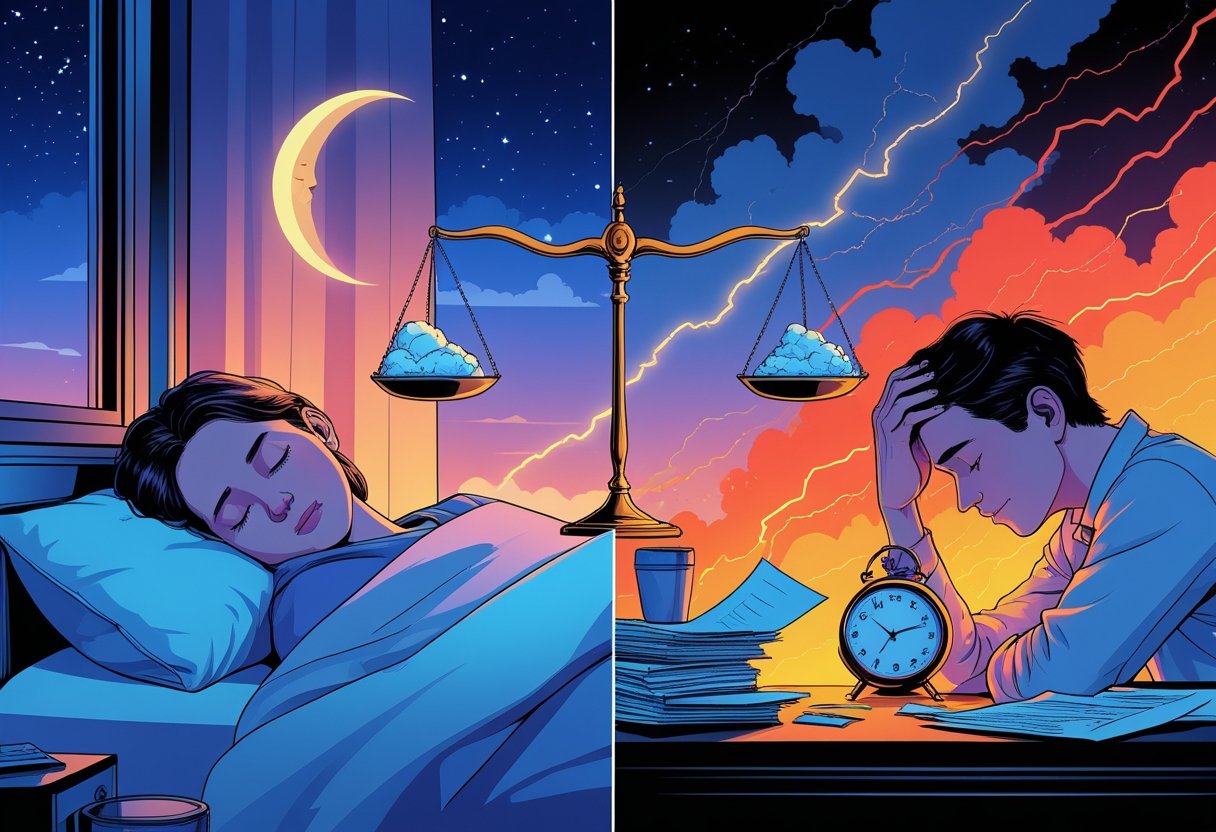
Managing Stress for Better Sleep

Stress can make it hard to fall asleep and often causes restless nights. Reducing tension, calming the mind, and creating a peaceful space each play a key role in improving sleep quality. Taking intentional steps can interrupt the cycle of stress that keeps rest out of reach.
Stress Reduction Techniques for Improved Sleep
To sleep better under stress, calming both body and mind during the day is essential. Practices like yoga, tai chi, and meditation help lower stress hormones while promoting relaxation. Simple deep breathing exercises ease anxiety and make falling asleep easier. Physical activity also relieves stress, though it works best earlier in the day to avoid overstimulation at night. Skipping caffeine and heavy meals late in the evening prevents additional strain on the body.
These actions offer effective ways to fall asleep when stress threatens to keep the mind and body alert.
Applying Relaxation Methods Before Bedtime
Building a bedtime routine that helps the body wind down is key. Tools like guided meditation, progressive muscle relaxation, and mindful breathing quiet the mind and release tension.
A warm bath soothes muscles and signals the body to prepare for rest. Dimming the lights and turning off screens at least 30 to 60 minutes before bed limits stimulation and supports a smoother transition to sleep.
These relaxation methods provide useful answers for anyone unsure of what to do when stress disrupts sleep.
Creating a Supportive Sleep Environment
A bedroom that’s quiet, dark, and cool increases the chance of falling asleep more quickly. Removing electronics such as phones, laptops, and TVs reduces common stress triggers. Comfortable bedding and a consistent sleep schedule support healthy patterns. Cutting back on alcohol and avoiding drug use also improves sleep quality by protecting natural sleep rhythms.
A restful environment supports the body’s internal clock and helps reduce the stressors that keep people awake.
Sleep Hygiene and Lifestyle Adjustments
Good sleep depends on daily habits that support the body’s natural rhythm and minimize disruptions. Simple changes, such as sticking to a sleep routine and managing caffeine intake or screen use, help prevent sleep problems and ease the effects of sleep deprivation.
Establishing a Consistent Sleep Schedule
Going to bed and waking up at the same time every day regulates the body’s internal clock. This regular schedule improves sleep quality and makes falling asleep easier over time. People should aim for 7-9 hours of sleep each night and avoid large variations between weekdays and weekends. Irregular sleep times cause difficulty falling asleep and contribute to daytime tiredness.
Using an alarm clock to wake up and following a calming bedtime routine support these habits. These practices prepare the body for rest and reduce sleep deprivation, which improves mood and focus.
Limiting Caffeine and Screen Time
Caffeine remains in the body for several hours and interferes with falling asleep. Avoiding caffeine after mid-afternoon prevents sleep disruptions.
Electronic devices emit blue light that suppresses melatonin, the hormone signaling the body to sleep. Reducing screen time at least an hour before bed allows melatonin levels to rise and helps people fall asleep faster. Turning off screens and avoiding caffeinated drinks promote a natural wind-down process.
These habits make it easier to maintain healthy sleep patterns and reduce stress linked to poor rest.
How a Supportive Mattress Helps Reduce Stress and Improve Sleep
A supportive mattress is essential in reducing stress by promoting better sleep quality. When the body receives proper support, pressure points get relieved, and discomfort decreases. This reduces nighttime tossing and turning, which allows for deeper, more restful sleep. Proper sleep lowers cortisol, the hormone linked to stress and anxiety.
Key benefits of a supportive mattress include:
- Improved spinal alignment to avoid pain and stiffness
- Reduced pressure on joints to enhance comfort
- Better circulation to prevent numbness or discomfort
These advantages help break the cycle in which stress causes poor sleep, and poor sleep worsens stress.
A quality mattress also supports emotional health. Deep sleep restores balance to brain chemicals like serotonin and dopamine, which influence mood and stress levels. As a result, focus improves, patience grows, and outlook becomes more positive. Choosing a durable mattress that retains its shape over time proves essential. Sagging mattresses increase discomfort and disturb sleep, thereby raising stress levels.
The Nolah Evolution 15” mattress combines advanced foam and coil technologies to provide targeted support and pressure relief. Its zoned support addresses key areas such as the shoulders and hips, while the cooling cover regulates temperature for uninterrupted rest. This design helps maintain proper alignment and reduces discomfort, which is why it’s a strong choice for those seeking both comfort and durability.

Frequently Asked Questions
Stress causes difficulty falling asleep, restless nights, and frequent waking. It leads to shorter sleep duration and lower sleep quality. Hormones like cortisol increase hunger and food cravings, which may further disrupt sleep.

